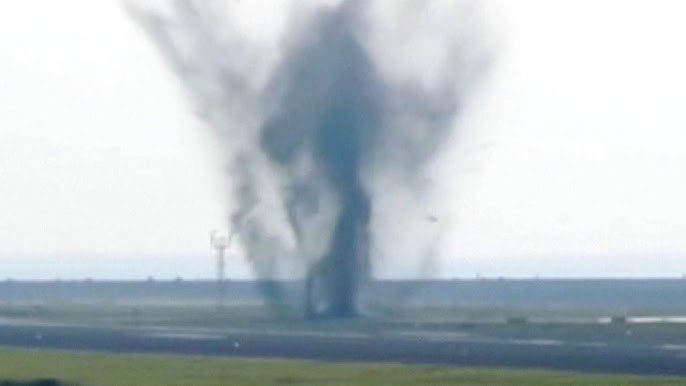JAPAN: A bomb dropped by the United States during the Second World War exploded at a Japanese airport on Wednesday (October 2), causing chaos and resulting in 80 flights being cancelled.
Japanese officials say the bomb caused a huge crater on the taxiway, but fortunately, no one was injured. Land and transport officials said there were no aircraft nearby when the bomb exploded at Miyazaki airport in south-west Japan.
According to a report in the Guardian newspaper, the explosion was caused by a 500-pound US bomb, but no one is sure what caused the bomb to detonate.
A video clip shows the blast of asphalt shooting out into the air like a fountain.
World War II bomb explodes on a taxiway at Miyazaki Airport in southwestern Japan forcing the closure of its runway.
The transport ministry said its officials found a hole with a diameter of 7 meters and a depth of 1 meter on the taxiway after an explosion was heard around 8 a.m… pic.twitter.com/eFYXPx2ri7
— Breaking Aviation News & Videos (@aviationbrk) October 2, 2024
Miyazaki airport was built in 1943 and was originally a Japanese navy flight training field. It was also where kamikaze pilots took off on suicide attacks.
Chief cabinet secretary Yoshimasa Hayashi said, “There is no threat of a second explosion, and police and firefighters are currently examining the scene.”
A bomb disposal team from Japan’s Self-Defense Forces confirmed the source of the blast.
There are many such unexploded bombs buried in Japan. According to a Reuters news agency report, some 2,348 bombs weighing 41 tonnes were disposed of in 2023.
Japan continues to suffer from the after-effects of bombs, whether from fear of possible explosions such as the above as well as the long-standing after-effects of the atomic bombs that rocked Hiroshima and Nagasaki in 1945.
The bombing had killed an estimated 140,000 people in Hiroshima and 74,000 in Nagasaki. But it was not just isolated to that one incident. Many years on, survivors continue to face leukaemia, cancer and many other side effects of radiation, even several decades later.
Hibakusha
The Hibakusha are the people who survived the Hiroshima and Nagasaki bombings. As survivors the Hibakusha have been vocal about eliminating nuclear weapons and have constantly worked to eliminate these.
According to a survey conducted among some 6000 Hibakusha, a vast majority of them feel that Japan should join the United Nations treaty banning nuclear weapons.
This would recognize Japanese citizens who have experienced pain and suffering.

